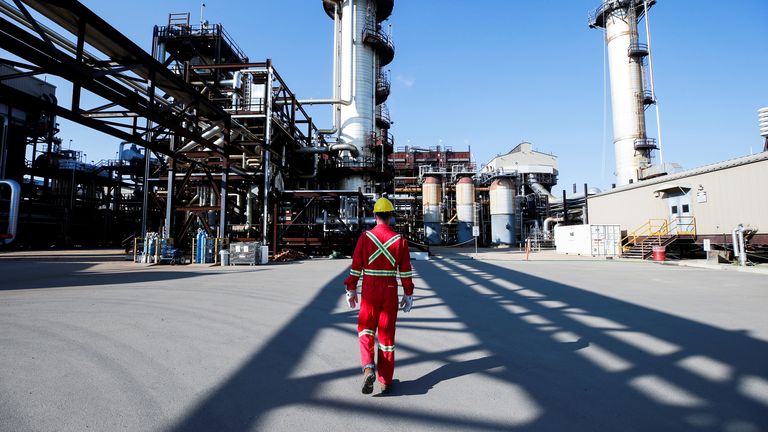Britain’s path to net zero will be far harder and more onerous unless Whitehall invests significant sums in schemes to capture carbon and store it under the ground, the government’s climate watchdog has warned.
Chris Stark, chief executive of the Committee on Climate Change (CCC), which advises the government on its climate policy, told Sky News there was no easy path to eliminate Britain’s carbon emissions if carbon capture – a technology which is still untested at scale – did not succeed.
The comments come at a critical time, amid concerns that the UK is moving too slow to flesh out its full plans to get to net zero, even as it prepares to host the seminal COP26 climate talks in Glasgow next month.
Image: Carbon capture remains controversial among many campaignersThere are fears that the chances of meaningful success at the summit are slipping, with China’s President Xi Jinping unlikely to come and many countries late in submitting their climate targets.
While it is rarely discussed in the mainstream, carbon capture is at the very centre of these ambitions.
AdvertisementCarbon capture aims to take the emissions from fossil fuel power plants or industrial processes like steel or cement production and to remove the carbon dioxide before it enters the atmosphere.
The CO2 is then stored under the ground or used elsewhere, but the net result is to reduce or even eliminate the atmospheric impact of some of the economy’s most important industrial processes.
More on Cop26 Related Topics: COP26climate changeHowever, while the technology has been used in a few pilot schemes elsewhere around the world, it has yet to be tried at scale, and in the case of the UK it has yet to be fully deployed at all.
What are these climate talks and why are they so important?
Mr Stark said that the CCC, which is responsible for mapping out the UK’s policy options for meeting its goal of net zero carbon emissions by 2050, had attempted to plot a course to that target without carbon capture, but none of its pathways succeeded without it.
“We published five different scenarios for getting to net zero,” he said.
“Each of them did include carbon capture to varying degrees. We did have a scenario without it.
“But interestingly, it didn’t quite get there, and you needed all the best of all the other scenario to be in place if you want to get close to net zero without carbon capture.”
But while carbon capture remains a crucial – by some measures the most important – means of eliminating the final, difficult-to-mitigate emissions, there is growing disquiet that so few projects have succeeded in capturing carbon at scale.
Queen ‘irritated’ by slow climate actionThe Department for Business, Energy and Industrial Strategy (BEIS) is currently mulling whether to provide funding for a series of schemes around the UK, but previous governments have cancelled such grants at the last minute, leaving a graveyard of unfinished carbon capture schemes around the country.
Mr Stark said “I think it can be done, but it does rely ultimately on the government putting some big policies in place some of them quite expensive. And for me that’s the bit that’s missing at the moment.”
Everything you need to know about COP26Among many campaigners, carbon capture remains controversial, since they argue that it gives existing fossil fuel producers an excuse to extract more gas and oil from the ground in the coming years.
They point out that much of the carbon capture being carried out in the world today is being used as a technique to maximise oil and gas extraction.
They warn that carbon capture will minimise the pressure on policymakers and companies to eliminate fossil fuels entirely without so-called offsets like carbon capture being used to reduce emissions to zero.
However, its advocates point out that fossil fuels will be needed for many more decades, as the world produces the equipment and plants needed to produce sustainable, renewable power.
Subscribe to ClimateCast on Spotify or Apple Podcasts.
They argue that without carbon capture the emissions from steel, cement and other industrial processes will only speed up climate change in the coming decades.
However, with the technology yet to be used at scale and with Britain still mulling its approach to carbon capture, for the time being those arguments remain somewhat academic.
According to the latest World Energy Outlook report from the International Energy Agency (IEA), as of 2020 some 139 megatonnes of CO2 had been captured and stored.
In order to achieve net zero by 2050, the IEA estimates that that will have had to increase to 7,740 megatonnes – an increase of around 5,500%.
A BEIS spokesperson said: “We are committed to making the UK a world-leader in green technology, including investing £1 billion of capital for Carbon Capture Usage and Storage technology.
“This is part of a wider package £12 billion of public investment we are mobilising for low carbon technologies and infrastructure to create new green jobs and reinvigorate our industrial heartlands.”
Watch the Daily Climate Show at 6.30pm Monday to Friday on Sky News, the Sky News website and app, on YouTube and Twitter.
The show investigates how global warming is changing our landscape and highlights solutions to the crisis.
